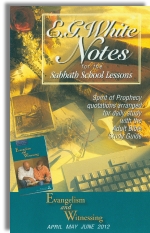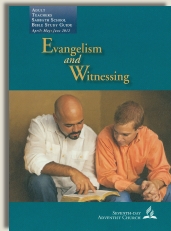|
||||||||||||||
Commentary on "Defining Evangelism and Witnessing"
Day 2: Sunday, April 1, 2012 - Evangelism Is . . . ?
Overview
This lesson attempts to define evangelism. It opens with the observation that human in general live lives of quiet despair; thus, the “main points of the first century evangelistic preachings” should be the same as today.
The lesson further states that to be an evangelist, “one must have personal understanding and experience of “the everlasting gospel”. The Jewish leaders saw something—most likely that fact that the apostles seemed “unable to talk about anything other than Jesus’ life and teachings”—that convinced them the apostles had been with Jesus. Therefore, it is necessary to articulate the “difference Jesus can make in anyone’s life if He is accepted as Lord and Savior.”
Finally, the lesson ends with a paragraph explaining that evangelism and witnessing are “a continual process rather than a single event”. Evangelism, the lesson points out, is “much more than jut the preaching of a message.” Evangelism isn’t complete until “people had become disciples and were thoroughly incorporated into the local group of believers.”
The texts for this lesson all come from Acts, and the question is asked, What are some specific themes about which the disciples preached that should be included in today’s evangelistic presentations?”
Observations
First, the texts for today are these:
And with great power the apostles were giving their testimony to the resurrection of the Lord Jesus, and great grace was upon them all. (Acts 4:33 ESV)
And every day, in the temple and from house to house, they did not cease teaching and preaching that the Christ is Jesus. (Acts 5:42 ESV)
Let all the house of Israel therefore know for certain that God has made him both Lord and Christ, this Jesus whom you crucified.”
Now when they heard this they were cut to the heart, and said to Peter and the rest of the apostles, “Brothers, what shall we do?” And Peter said to them, “Repent and be baptized every one of you in the name of Jesus Christ for the forgiveness of your sins, and you will receive the gift of the Holy Spirit. For the promise is for you and for your children and for all who are far off, everyone whom the Lord our God calls to himself.” (Acts 2:36-39 ESV)
And he said, “Behold, I see the heavens opened, and the Son of Man standing at the right hand of God.” (Acts 7:56 ESV)
And when the Gentiles heard this, they began rejoicing and glorifying the word of the Lord, and as many as were appointed to eternal life believed. (Acts 13:48 ESV)
The lesson refers to these texts as it asks the reader to find “specific themes” which should be included in evangelistic presentations. This exercise betrays the fact that Adventism does not embrace or even know the real gospel.
These fragments from stories of the first evangelism done in the Church are not revealing “themes”. There is no list of themes from which we must choose to design our evangelism. There is ONE thing that must be preached: Jesus Christ crucified for our sin, buried, and risen on the third day.
This lesson betrays the fact that from an Adventist perspective, the simple gospel of Jesus Christ is not the WHOLE truth. The final paragraph stating that evangelism and witnessing are a continual process is the “loophole” that makes room for the teaching of the “Adventist distinctives”, or the “testing truths”. The emphasis in the final paragraph on having an “ongoing strategy” for nurturing new believers until they have “become disciples” and have “thoroughly incorporated into the local group of believers” is veiled language for saying those new believers who respond to the message of Jesus need to be further taught to keep the Sabbath, to eliminate “unclean meats” and preferably to become vegetarian if not vegan, to tithe, and to honor Ellen White in some capacity.
Moreover, they also have to learn the Adventist teaching that humans do not have spirits other than breath, and this teaching leads to the Adventist doctrine that people do not survive after death. Ultimately, these hapless new believers must embrace the great controversy worldview and see themselves as helping to vindicate God’s character and His law before a watching universe.
So, although it is not spelled out, “evangelism” is defined by Adventist standards, not biblical ones. Witnessing and teaching the gospel is not “a process”. Rather, it is the clear articulation of Jesus’ full payment for human sin and is a message of hope and invitation for others to repent and receive the Lord Jesus.
This simple response is all that is needed, and evangelism can be a one-time moment. To be sure, new believers must be discipled, but biblical discipling involves helping them learn to submit their emotions and temptations to the Lord Jesus and to immerse themselves in Scripture as a means of learning what God’s will for them is.
Jesus said this:
Truly, truly, I say to you, whoever hears my word and believes him who sent me has eternal life. He does not come into judgment, but has passed from death to life. (John 5:24 ESV)
Belief in Jesus does not require Sabbath keeping, vegetarianism, or joining a specific denomination. We are saved completely when we place our faith in the Lord Jesus and repent of our sin. We pass at that moment out of death into life, and our spirits live on with Jesus even after our bodies die (2 Cor, 5:1-10).
Evangelism requires first that we know the true gospel and that we ourselves know Jesus. It requires that we surrender our beliefs to Him and allow His word to teach us truth. We have to leave behind the false prophet of Adventism and allow the Holy Spirit to teach us Scripture without an EGW hermeneutic.
Knowing Jesus is our only requirement—but knowing Jesus is everything. Without knowing Jesus, we are eternally dead in sin and objects of God’s wrath (Eph. 2:3).
Once we have been born of His Spirit, evangelism and witnessing are as natural as breathing. The Holy Spirit’s gift to us is the boldness and ability to speak well of Jesus and to bring them to eternal life in Him. The true gospel does not just give “the promise of eternal life”. The gospel brings eternal life now, the minute we place faith in the Lord Jesus.
We pass out of death into life and do not come into judgment when we believe in Jesus.
Summary
- Evangelism is not composed of several necessary “themes”.
- Evangelism is not a “process”.
- Evangelism is the declaration of the simple gospel: Jesus died for our sin, was buried, and was raised on the third day according to Scripture (1 Cor. 15:3-4).
- True evangelism does not include teaching new believers the Sabbath, vegetarianism, souls sleep, and EGW.
- We cannot evangelize or witness unless we have place our own faith in the Lord Jesus and have been born again of the Holy Spirit.
- Without being born again, we have no power or authority to “witness”.
- Jesus is all we need. The gospel includes no “extra knowledge”.
Copyright 2012 BibleStudiesForAdventists.com. All rights reserved. Revised March 30, 2012. This website is published by Life Assurance Ministries, Camp Verde, Arizona, USA, the publisher of Proclamation! Magazine. Contact email: BibleStudiesForAdventists@gmail.com.
The Sabbath School Bible Study Guide and the corresponding E.G. White Notes are published by Pacific Press Publishing Association, which is owned and operated by the Seventh-day Adventist church. The current quarter's editions are pictured above.
Official Adventist Resources
Standard Edition Study Guide Week 1
Teacher's Edition Study Guide Week 1
Easy Reading Edition Study Guide Wk 1
Search the Complete Published Ellen G. White Writings
Please Support This Project


